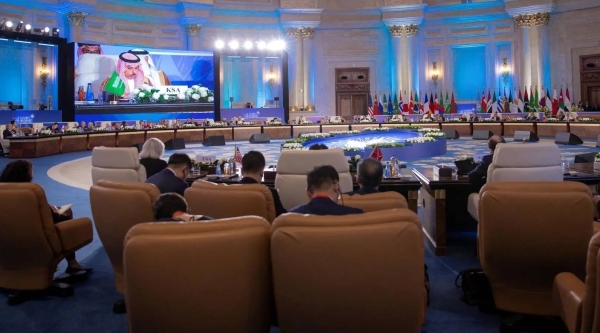
Israel’s Prime Minister Yair Lapid used his time at the 77th Session of the UN General Assembly to paint a glowing portrait of his nation.
During his address on Thursday Sept. 22, he detailed the many positive achievements of the Israel and emphasized that it has chosen “not to dwell on the pain of the past.”
That’s an understatement.
It would be hard to describe or present a positive image of Israel if Lapid had instead “dwelled” on, or even skimmed over, the major events of the past 75 years, which has been showcased by brutality, religious discrimination, and violence.
While Lapid described how he had to take his special needs child to a bunker when last May, “missiles were exploding above our home,” he didn’t explain that those missiles were fired in retaliation for Israeli military strikes and raids throughout Gaza and the West Bank. And that Israel’s actions resulted in the murder of an American Palestinian journalist, Shireen Abu Akleh, who he never mentioned by name during his speech.
Lapid said Israel has one condition “stop firing rockets and missiles at our children” as if Palestinian missiles come even close to the precision of Israel’s high-tech missiles and rockets that have killed thousands over the years. These victims couldn’t hide in bomb shelters and instead were often killed when those bombs slammed into their homes.
But Lapid did throw one thing into the mix during his UNGA77 address, to give it some significance over the one-sided speeches of his predecessors.
Lapid began by inaccurately describing the Palestinians as Israel’s “closest neighbors” — they are actually occupied citizens denied their most basic human rights by Israel — and said, surprisingly: “An agreement with the Palestinians, based on two states for two peoples, is the right thing for Israel’s security, for Israel’s economy and for the future of our children.”
Lapid continued: “Peace is not a compromise. It is the most courageous decision we can make.”
Rather than look past the majority of Lapid’s propaganda and focus on this one significant public statement from an Israeli leader, most Palestinians brushed it off as inconsequential.
The next day, Palestinian Authority President Mahmoud Abbas addressed the UN and did look back on the “pain of the past” reciting the history of violence and acknowledging Abu Akleh’s murder by an Israeli sniper who has not been punished. But he welcomed Lapid’s call for a two-state solution calling it a “positive development.” He emphasized that Palestine is also “looking forward to peace.”
But peace is not something Abbas can achieve by himself. The balance of power rests almost entirely with Israel. Palestinians have far less influence than Israel.
The UN should grant Palestine full member status, as requested by Abbas in his remarks, if only to narrow the power gap between Israel and Palestine.
Ray Hanania
The burden is on Israel’s shoulders. And just like the Palestinians, Israel has extremists, too, who hold their people hostage to anger and revenge. Israeli extremists have done everything to prevent peace, including assassinating one of their own prime ministers.
Now I get how Palestinian activists and leaders are blinded by rage over Israel’s often unpunished killings.
Many Palestinian leaders and activists have been murdered by Israel, often described as “extra-judicial killings,” which technically is a war crime for any nation that embraces the Fourth Geneva Convention, which Israel does not.
Palestinians are killed at a far higher rate than Israelis. If Lapid had to hold his daughter’s hand fleeing to a bomb shelter, then you know at least 1,000 Palestinian fathers were holding the hands of their children as they fled Israel’s air and missile attacks, snipers and land assaults. But unlike Lapid, they have no place to hide.
Abbas and the Palestinian leadership face a difficult challenge. They must break free from the extremists holding the conflict in a perpetual headlock. Those extremists want all or nothing. While they speak out legitimately against the atrocities committed by Israel’s military, they never discuss compromise or peace. The extremists want the violence to continue because without it, they have no foundation for their leadership.
Normally, this would be the point where an American president might step in to prompt the two sides to take the next step, face-to-face negotiations.
Unfortunately, I don’t believe President Joseph Biden is capable of that. I am concerned that if he tried, he might misspeak, in his usual manner, and make matters worse.
Lapid’s words mean nothing unless he takes the courageous initiative. Lapid can initiate peace talks, despite the political pressure from the growing extremist movement in Israel, and move the two sides to peace.
As peace nears, we know that the extremists on both sides will do everything they can to derail it. It would take a lot of courage to take that call one step further. But given the political realities of Israel, I’m not sure Lapid will.
Until Lapid finds that will, the UN should grant Palestine full member status, as requested by Abbas in his remarks, if only to narrow the power gap between Israel and Palestine.
It will also remind Israelis that despite their power, they don’t control all the cards.
Ray Hanania is an award-winning former Chicago City Hall political reporter and columnist. He can be reached on his personal website at www.Hanania.com. Twitter: @RayHanania
Disclaimer: Views expressed by writers in this section are their own and do not necessarily reflect Arab News" point of view












